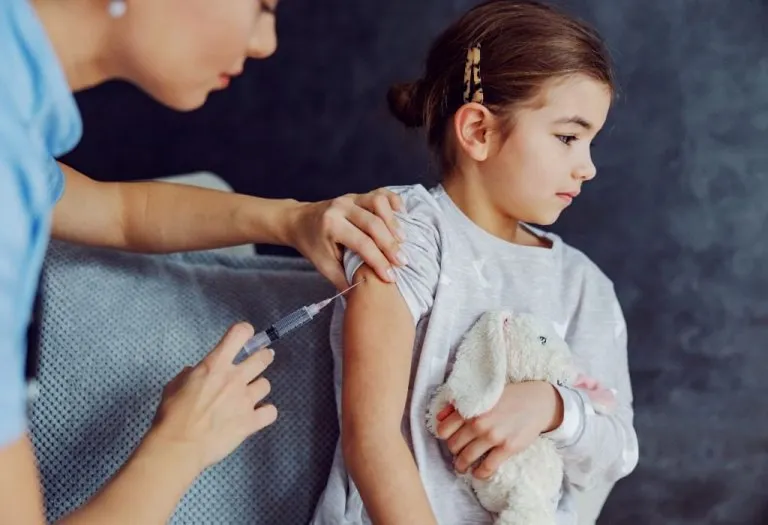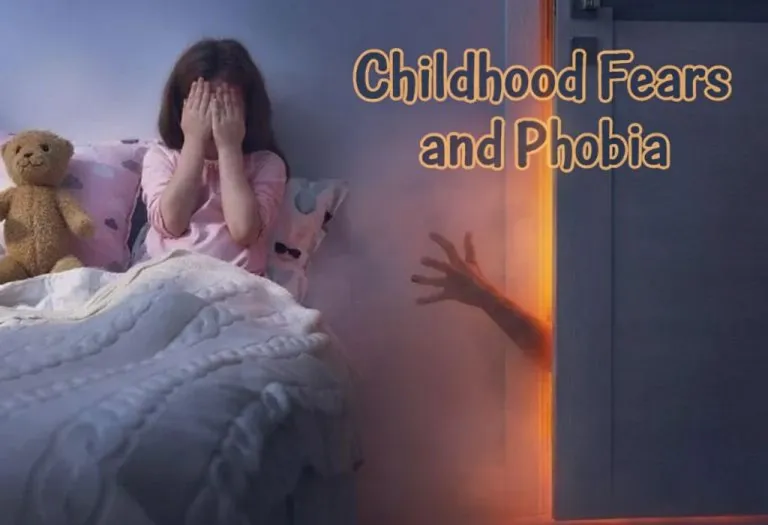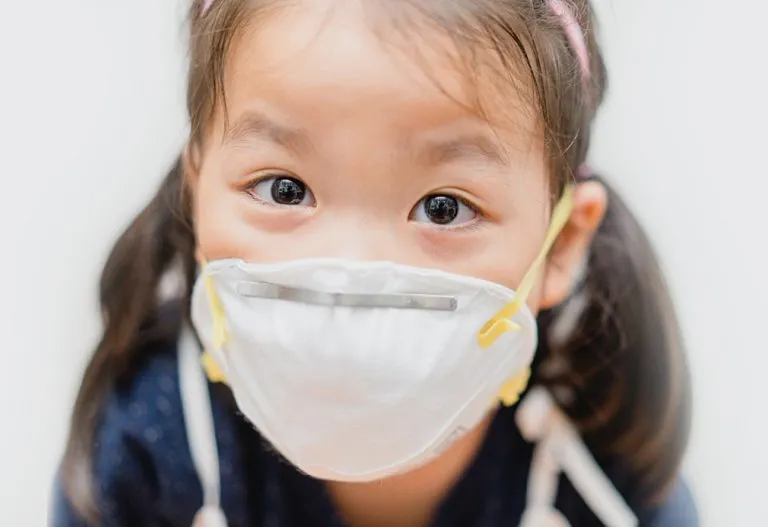HPV Vaccination for Girl Child – Importance & When to Get?
What parents should know about HPV vaccination to safeguard their girl child’s health.

The HPV vaccine is the first line of defence against HPV-related diseases, particularly HPV-related cancers. HPV vaccines are mainly designed to protect against the HPV16 and HPV18 viruses, which cause cervical cancer, genital warts, and more (1). Following the push for the Human Papillomavirus (HPV) Vaccine to be included in India’s Universal Immunization Programme (UIP), the buzz surrounding the HPV vaccine in India and its uses has skyrocketed. Despite so much information, there’s still plenty of confusion floating around the use, dosage, and safety of this highly effective vaccine. If you have a girl child, we recommend reading this post and ensuring their future is secured.
What Is the HPV Vaccine?
The HPV vaccine is a cervical cancer vaccine formulated primarily for girls in the 9-14 age group. Two doses are administered – the first between 0-6 months and the second between 5-15 months. It can also be given to girls and women aged 15-26 or 27-45 in 3 doses.
This article focuses on the correlation between HPV and cervical cancer and the ways to recognise and prevent it.
What Is Cervical Cancer?
Let’s uncover more about the cervical cancer definition. Cervical cancer refers to the growth of abnormal cells in the lining of the cervix, which is situated in the lower region of the uterus that connects the vagina (2). It is caused by the HPV strain, which is passed from skin-to-skin contact, mainly through sexual activity (2), and can metastasise (spread) to other parts of the body, like the vagina, rectum, bladder, liver, and lungs.
What Causes Cervical Cancer?
Cervical cancer is most commonly caused by the HPV strain, which is passed on through sexual contact. HPV16 and HPV18 are two high-risk strains which lead to about 70% of all cervical cancer cases worldwide (3). While 8 out of 10 women are said to have contracted genital HPV at some point in their lives, it doesn’t always lead to cervical cancer (4). Other causes include:
- Smoking or inhaling smoke passively
- A weak immune system due to HIV infection or other illnesses that affect the immune system (3)
Doctor’s Quote:
HPV viruses are very common and cause cancers in both men and women. A simple vaccince can save the children (both girls and boys) from the dread of a much preventable cancer.
Cervical Cancer in India
It has been noted that India has a population of 511.4 million women aged 15 years and older who are at a high risk of contracting cervical cancer. Cervical cancer in India is the 2nd highest cause of cancer-related deaths in India, with over 1.25 lakh cases and over 75,000 deaths each year. It accounts for 9.4% of all cancer cases in India, and the mortality rate of cervical cancer in India is the highest in Asia.
Signs and Symptoms of Cervical Cancer
If HPV has caused the cells in your cervix to mutate and develop into cancer, you may experience various symptoms, which are signs of cervical cancer. In the early stages, they present themselves as (9):
- Pelvic pain or general pain during sexual intercourse
- Extended menstrual bleeding that is heavier and longer
- Unexpected vaginal bleeding after intercourse, between periods, or during a pelvic exam
- Vaginal bleeding after menopause
- Change in vaginal discharge – can be watery, have a strong odour, and even contain blood.
In later stages, symptoms of cervical cancer include:
- Back pain
- Swelling in the legs
- Pelvic pain
- Kidney failure
- Abdominal pain
- Fatigue
- Bone ache
- Loss of appetite, which leads to weight loss
- Difficulty urinating that may include bleeding
- Painful bowel movement due to rectum pain that may consist of rectal bleeding (3), (4)
Risk Factors of Cervical Cancer
The risk of developing cervical cancer increases if:
- Consuming medicine that inhibits the immune response, used to prevent organ rejection, or to treat cancer or an autoimmune disease (3)
- Have a weak immune system
1. In Girl Child
Child cervical cancer or vaginal cancer is rare but can occur if:
- They have not been vaccinated against HPV
- Are sexually active before the age of 18 or within a year of your first period
- Have a weakened immune system.
- They are obese, which leads to lower detection of pre-cancer or cancer cells (3)
2. In Pregnancy
Risk factors increase if:
- Prescription of diethylstilbestrol (DES) is given during pregnancy between 1939 and 971 (4)
- They are obese, making it difficult to detect
- Actively or passively smoking
- Using contraceptive pills or birth control pills or giving birth multiple times (3)
- Have multiple sexual partners or contract a sexually transmitted disease
Why Should Every Girl Get an HPV Vaccine?
With a high population of girls and women 15 and older, the chances of contracting cervical cancer are high in India. Based on research by the World Health Organisation (WHO), it has been noted that almost all sexually active women have contracted HPV at some point. While HPV infections don’t always develop into cancer, HPV and cancer go hand-in-hand, and taking the HPV vaccine reduces the risk of cervical cancer. Early immunisation acts as a shield, and widespread vaccination leads to herd immunity, which decreases the prevalence of HPV in the community.
When Should Your Girl Child Get Vaccinated?
It is advised to vaccinate your girl child as early as medically possible. The HPV vaccine can be administered at nine years of age (5). The age limit for the cervical cancer vaccine is 45. However, it is most viable if administered by the age of 26. If you are between 27 and 45, consult your doctor regarding the efficacy and health risks of taking the HPV vaccine (6).
Cervical Cancer Vaccines in India and Their Cost
Cervavac is the first Indian HPV vaccine developed by the Serum Institute of India, based in Pune. It aims to prevent cervical cancer and other HPV-related cancers. It targets the HPV16, HPV18, HPV6, and HPV11 strains. The cervical cancer vaccine price ranges between INR 200 and INR 400. The quadrivalent vaccine can be administered in two or three doses based on age.
FAQs
1. What are some internationally available vaccines for cervical cancer?
Two primary cervical cancer vaccines are FDA-approved. The first is Ceravix, a bivalent vaccine which works against the HPV16 and HPV 18 strains, which are the cause of 70% of cervical cancer cases. It is administered in two doses and is recommended for girls between 9 and 14 years of age.
The second is Gardasil, which is a quadrivalent vaccine that covers HPV16, HPV18, HPV6, and HPV11, the latter two of which cause genital warts. It is recommended for girls and women between 9 and 26 years and can be given in two or three doses based on age.
2. How safe is the India-made HPV vaccine?
Clinical trials have shown that the Indian-made Cervavac HPV vaccine works like the international Gardasil vaccine. It has been observed that Cervavac demonstrated high efficacy in preventing cervical cancer, HPV-related infections and pre-cancerous lesions (7).
3. What age is too late for the HPV vaccine?
The HPV vaccine is only administered to men, women, and girls between 9 and 45 years of age. Its highest efficacy is up to 26 years of age. Please consult your physician if you want to take the vaccine between 27 and 45 (6).
4. Is HPV a risk after vaccination?
If you have been vaccinated against the most common strains that cause cervical cancer, HPV16 and 18, then coming in contact with them in the future is not risky. However, there are over 200 types of HPV, and most sexually active people come in contact with HPV. Most HPV infections are non-malignant and can be cured with treatment.
5. How long does the HPV vaccine protect you?
The CDC followed people who received the HPV vaccine and noted that the vaccine’s efficacy is still high and the protection provided lasts a long time (8).
Awareness about HPV and cervical cancer, and the use of the HPV vaccine as a mode of prevention, is vital to take the necessary steps required to protect girls and women from it. If you haven’t had your daughter vaccinated against HPV, visit your nearest hospital to learn about availability and the doctor’s recommended schedule.
Also Read:
MMR Vaccine
Childhood Vaccinations for Various Diseases
Mission Indradhanush – Vaccination Program
Was This Article Helpful?
Parenting is a huge responsibility, for you as a caregiver, but also for us as a parenting content platform. We understand that and take our responsibility of creating credible content seriously. FirstCry Parenting articles are written and published only after extensive research using factually sound references to deliver quality content that is accurate, validated by experts, and completely reliable. To understand how we go about creating content that is credible, read our editorial policy here.
1. World Health Organisation – Cervical Cancer
2. Mayo Clinic – Cervical Cancer
3. National Cancer Institute – Cervical Cancer Causes, Risk Factors, and Prevention
4. Cancer Council – Cervical Cancer
6. Mayo Clinic – HPV vaccine: Who needs it, how it works
7. Medanta – Recent Update: Ceravac – India’s First HPV Vaccine for Cervical Cancer
8. Centers for Disease Control and Prevention – HPV Vaccination
9. International Gynecologic Cancer – Cervical Cancer














.svg)
















